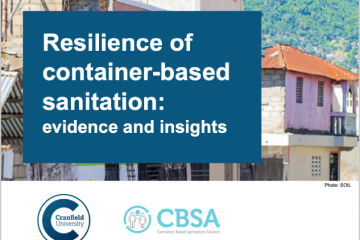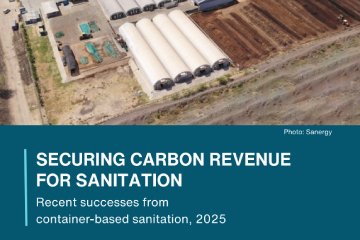In 2022, the CBSA worked with the carbon finance consultancy South Pole on a feasibility study to understand whether carbon credits could become a viable income stream for sanitation providers and help to reduce the funding gap. Our new briefing paper summarises the study’s findings, which found that carbon credits can generate revenue for actively managed sanitation but that several obstacles hinder the full potential.
Download Unlocking carbon credits for sanitation (PDF 594Kb), for a full overview of the study’s findings, and the implications for making carbon credits a sustainable revenue stream.
Key messages
Unmanaged sanitation is a major contributor to the climate crisis
Sanitation is estimated to contribute 2-6% of global methane and 1-3% of global nitrous oxide emissions. These largely stem from anaerobic digestion in pit latrines and septic tanks that are not frequently emptied, and from wastewater treatment plants lacking methane capture.
Active management through frequent emptying almost eliminates emissions
By quickly collecting and treating waste, actively managed sanitation systems such as Container Based Sanitation (CBS) reduce the anaerobic degradation that produces these gases. Working with the carbon finance consultancy South Pole, we studied five CBS operators and found that their projects would eliminate 79% to 93% of baseline emissions, depending on the treatment methods used and contextual parameters.
Five CBS services studied could earn carbon credit income of US$2.4 million over five years, at US$3-30 per toilet per year, at current scale up projections
Our study of five CBS operators shows that carbon credits can provide a viable revenue stream for providers operating at a sufficient scale, particularly when co-treating other waste. Modelling CBS scale up projections using existing carbon credit methodologies, the five services examined would collectively earn US$2.4 million in eligible carbon credit revenue over five years for approximately 81,000 toilets and co-treated solid waste, using average 2022 carbon prices.
Profitability is limited by the exorbitant cost of certification, which reduces potential profit by 40%, and the significant monitoring burden
The annual cost of validation and verification alone is around US$53,000 per organisation under the Gold Standard. Add to that issuance fees, revenues for the services examined reduced by 40% over five years, at close to a million US dollars, leaving a surplus of US$1.4 million. To reach a surplus after paying these fees, the five CBS operators studied would need to install and operate an additional 4,000 to 20,000 toilets to their current operations (depending on the type of toilet and treatment process used). The study did not include monitoring costs, which can be significant (unless registries allow new digital approaches).
Improving baseline data, co-treating other waste and monetising social impact can substantially increase revenues
The carbon credits that can be claimed could increase by 30% with more accurate baseline data, as current IPCC figures significantly underestimate the full extent of emissions in containment. Collecting and treating additional waste such as food or animal waste can significantly improve the viability of a carbon credits project for sanitation providers due to the large increase in scale of treated waste and resulting emission reductions, highlighting potential complementary co-treatment business models for enterprises seeking to maximise carbon credit revenue. Furthermore, projects with positive social impacts have been sold for higher prices which could potentially provide further additional revenue for CBS projects.
Current rules prevent existing toilets from earning carbon credits; including them could increase revenue by almost 50%
Carbon credit registries typically do not allow existing infrastructure to be eligible for carbon credits, under the principle of additionality, affecting incumbent sanitation operators, who will have to scale significantly to generate revenue.
Carbon credits can be a significant step towards accessing other climate funds
Pursuing carbon credits revenue can be risky but can be a meaningful step towards structuring sanitation projects to meet the rigorous requirements of other sources of climate finance, such as the Green Climate Fund (GCF) which, to date, have remained largely out of reach to the water, sanitation and hygiene (WASH) sector.
Mitigation and adaptation go hand-in-hand for sanitation
Sanitation is an essential public good, which has to be publicly funded; carbon credits may reduce the funding gap but won’t eliminate it. Ensuring residents have safe, actively managed sanitation is also essential for climate resilience, as CBS has shown to be for flood-prone areas and water-scarce areas.
Recommendations
Municipalities and utilities
- Acknowledge sanitation’s contribution to the climate crisis.
- Incentivise climate-smart sanitation in policy, regulation and concessional contracts.
- Ensure off grid sanitation services regularly remove sludge (e.g. with small containers to encourage frequent emptying) and treat it to reduce GHG emissions.
National governments
- Align sanitation policies with climate commitments and include them in National Adaptations Plans (NAP).
- Include sanitation emissions in Nationally Determined Contributions (NDC), as less than 0.2% of current NDC activities are sanitation related.
Investors, funders and lenders
- Support climate-smart and -resilient sanitation by incorporating climate change mitigation outcomes as essential criteria for sanitation investments, loans, and funding.
- Support sanitation providers to scale services and unlock carbon credits as an additional revenue stream, reducing the burden on public or aid funding.
- Fund research that improves the accuracy of GHG emission estimates for off grid sanitation, to increase related eligible emission reductions and potential income.
Intergovernmental Panel on Climate Change (IPCC)
- Update the IPCC guidelines so that the emission factors (EFs) and methane correction factor (MCF) used to calculate methane production are based on up-to-date empirical data.
- Carbon credit issuing companies
- Reduce the complexity and cost of certifying smaller-scale projects.
- Allow digital solutions that reduce the complexity and cost of monitoring.
Researchers
- Undertake empirical and modelling work to update estimates of greenhouse-gas emissions from off-grid sanitation (as is currently being undertaken by the SCARE project).
- Study the extent to which scheduled or frequent emptying reduces emissions.
In addition to advocating for the above, the CBSA is:
- Working to make carbon offset methodologies more accessible to CBS operators by simplifying the process and maximising the amount of emission reductions eligible for carbon credits.
- Mitigating the risk of pursuing this revenue for CBS providers, including by producing a carbon credit certification guide and exploring a potential aggregator role for CBSA.
- Supporting CBS operators to register carbon credits projects and derive as much value as possible from them.


